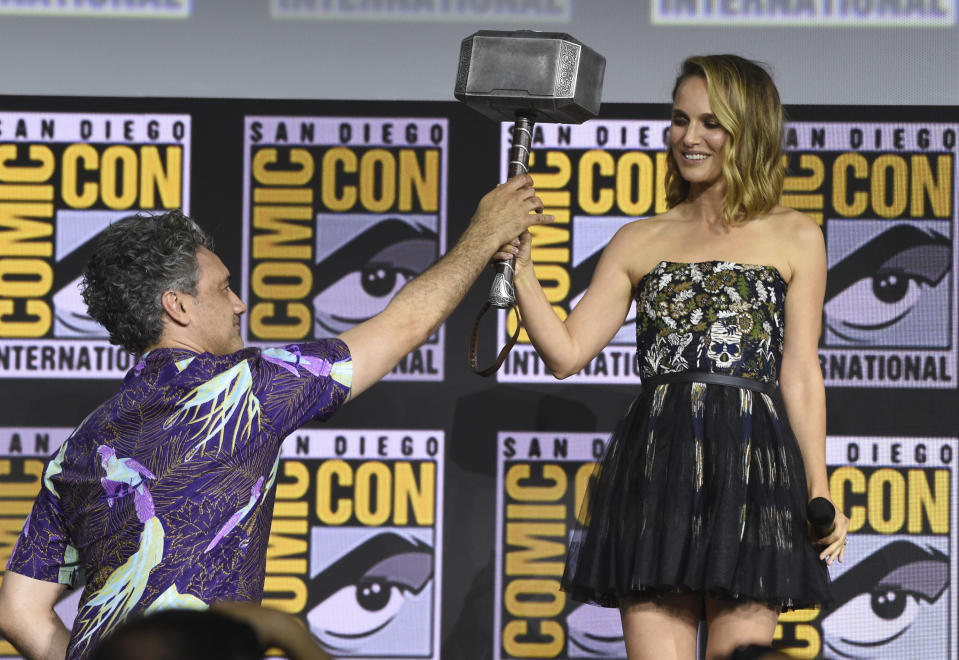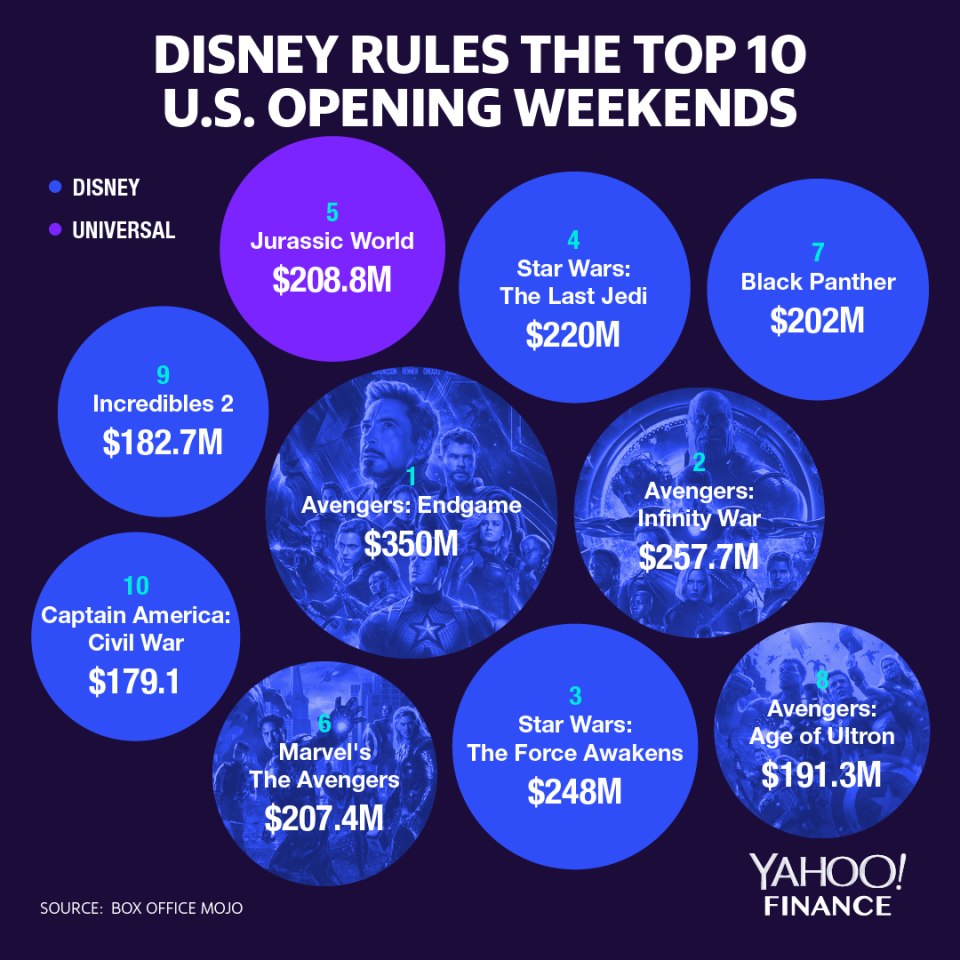Disney's next Marvel movie phase should scare its competitors
Over the weekend, “Avengers: Endgame” surpassed “Avatar” to become the No. 1 highest-grossing film ever at the global box office, with $2.79 billion.
Yes, Disney and Marvel Studios had to re-release “Endgame” back into theaters to do it, and the numbers are not adjusted for inflation, and “Star Wars: The Force Awakens” (also Disney) still had a bigger domestic box office haul. But Marvel now own the bragging rights of having the world’s No. 1 movie ever. (It also owns No. 2, since Disney acquired the rights to “Avatar” as part of its Fox deal.)
On the same weekend, Marvel all but guaranteed its box office dominance will continue for the next two years.
At Comic-Con 2019, Marvel trotted out “Phase 4” of its Marvel Cinematic Universe (MCU). There are sequels, prequels, entirely new movie franchises, and original TV series for the Disney+ streaming service. With the new announcements, major new movie stars are joining the MCU, potentially bringing new fans with them. The lineup is sure to help Disney rake it in at the box office and will help boost its streaming gambit too.

MCU: Phase 4
Here are just some of the movies Marvel revealed at Comic-Con: A “Black Widow” origin movie (May 2020), set before the events of “Endgame,” starring Scarlett Johansson and adding Rachel Weisz, David Harbour (“Stranger Things”), Florence Pugh (“Lady Macbeth”), and O.T. Fagbenle (“The Handmaid’s Tale”); a “Doctor Strange” movie sequel (2021) starring Benedict Cumberbatch; a fourth “Thor” movie (2021), starring Chris Hemsworth and bringing back Natalie Portman; “Shang-Chi and the Legend of the Ten Rings,” starring Simu Liu, Marvel’s first Asian superhero lead; and “The Eternals” (2020), a completely new movie franchise starring Angelina Jolie, Salma Hayek, Lauren Ridloff (“The Walking Dead”), Richard Madden (“Game of Thrones” and “Bodyguard”), Kumail Nanjiani (“The Big Sick”), and Brian Tyree Henry (“Atlanta”). Gizmodo calls the Eternals cast “the vanguard of the future of the Marvel Cinematic Universe.”
Add to all that a slew of content coming exclusively to Disney+ including: “The Falcon and Winter Soldier” (2020), a spinoff series starring Anthony Mackie and Sebastian Stan; “WandaVision” (2021), a spinoff series starring Elizabeth Olson; and “Loki” (2021), a spinoff series starring Tom Hiddleston.
Marvel also unveiled a movie that might prove to be the biggest of its entire new slate, and it is not part of MCU Phase 4: “Blade,” with mega-star Mahershala Ali as the vampire hunter. It’s a reboot of the same “Blade” franchise that starred Wesley Snipes; Disney owns the rights to the character. “Black Panther,” with a black lead and predominantly black cast, mobilized a new generation of Marvel fans, finally brought more diversity to superhero movies, and grossed more than $1.3 billion globally – “Blade” could be even bigger.

Superhero overload?
Some critics say Marvel is flooding the market and that the appetite for superhero movies will soon wane. Disney is going to put that theory to the test.
But adding new Hollywood stars to the MCU, both newer (Nanjiani) and mega-famous (Jolie), has the benefit of bringing in their own fans who may not identify as Marvel moviegoers. (Most of the actors in the newly announced movies and shows have posted excitedly on Instagram.) It also hits reset on the entire category, and the slate has new franchises for newcomers to start with (“The Eternals”), while still catering to existing devotees with “Thor” and “Dr. Strange” sequels.
It’s also hard to argue that people are getting sick of superheroes when you look at the numbers: Disney now has nine of the top 10 biggest domestic opening weekends ever, and six of the nine were Marvel movies. (That said, not every superhero movie is a hit: “Dark Phoenix” was a giant bomb.)
Break up Disney?
A better question about Disney is whether its box office dominance is getting too visible. Over just 13 years, Disney has made four acquisitions that created a towering giant, the Anheuser-Busch InBev of the movie business: it bought Pixar in 2006 for $7 billion, Marvel Studios in 2009 for $4 billion, Lucasfilm in 2012 for $4 billion), and 21st Century Fox’s entertainment assets this year for $71.3 billion. Marvel movies have banked more than $18 billion total at the global box office since 2009. Even in a slow summer box office season so far this year, the hits are Disney: “Aladdin,” “Toy Story 4,” “Spider-Man: Far From Home,” and “Lion King.” Disney has the top six movies of 2019 so far.
All of this is why Disney CEO Bob Iger earned $65.6 million in salary in 2018, a sum that Disney heiress Abigail Disney calls “insane” even as she acknowledged, in an interview with Yahoo News, that he is “perhaps the greatest CEO in the country right now.”
Disney’s utter box-office dominance has some columnists calling for regulators to break up the company. That may be unlikely (anti-trust violation depends not on a company’s size but whether it is creating unfair pricing for consumers), but it does signal that with each mega box-office hit, Disney invites scrutiny for its size and power.
The next phase of Marvel movies will likely bring more box-office cash for Disney, and further stoke the public conversation about the downsides of Disney’s dominance.
—
Daniel Roberts is a senior writer and show host at Yahoo Finance and closely covers Disney. Follow him on Twitter at @readDanwrite.
Read more:
Disney’s Marvel boom is far from over
Sinclair buys 21 former Fox sports networks from Disney
Disney+ has a secret weapon: millennial nostalgia
Disney says streaming is now its ‘number one priority’
